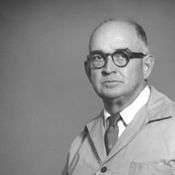Ben Earl Looney
| Ben Earl Looney | |
|---|---|
|
Looney photo (Center for Louisiana Studies at the University of Louisiana at Lafayette) | |
| Born |
June 2, 1904 |
| Died |
May 25, 1981 (aged 76) Lafayette, Louisiana |
| Resting place | Body donated to medical science |
| Residence |
Various locations, including: |
| Alma mater |
Minden High School |
| Occupation | Artist; Author |
| Spouse(s) | Never married |
| Parent(s) | Julian A. and Mollie McKinney Looney |
Ben Earl Looney (June 2, 1904 – May 25, 1981)[1] was a Louisiana artist and author known for his Water Colors of Dixie and Cajun Country, pen and ink sketches of Acadiana.
Background
Looney was born in the Yellow Pine community, located south of Sibley in Webster Parish to Julian A. Looney (1871–1958) and the former Mollie McKinney (1872–1932).[2] The community was so named because the original buildings were all constructed in yellow pine timber. Julian and Mollie Looney shared a July 17 birthday but one year apart.
Ben Earl Looney graduated in 1923 from Minden High School in Minden, the seat of government of Webster Parish, where he was known as "Earl". His artistic talent was already apparent, as he was the art editor of the yearbook staff. One of his classmates was Leland G. Mims, a 1921 graduate who was later a small businessman in Minden and a veteran member and president of the Webster Parish Police Jury, the parish governing council.
Looney thereafter attended the Louisiana State University School of Journalism in Baton Rouge, Methodist-affiliated Centenary College in Shreveport, the Corcoran College of Art and Design in Washington, D.C., and the Summer School of Arts in Eastport, Maine. He studied watercolor under George Ennis.
Art career
Looney launched his art career in his studio in Minden. In 1935, he moved to Baton Rouge to instruct art[3] and was quickly made the first chairman of the new Department of Fine Arts.[4] Over the years, he taught art in Sarasota, Florida, in a school-museum financed by the John Ringling circus family. There Looney taught Frank T. Norman, the mayor of Minden from 1958 to 1966, who became the first student to register at the new Ringling School of Art.[5] Looney taught painting in New York City for nine years. He also taught art in Weston, Massachusetts; Bremerton, Washington; and Greensboro, North Carolina. He spent his last years in Lafayette, Louisiana, the showcase for his Cajun works.
Looney derived subject matter from forty-five of the fifty states plus Canada and Mexico. Ford Times, an in-house organ of the Ford Motor Company, published some forty-five of his paintings and articles. Another Looney painting is in the magazine of the Smithsonian Institution in Washington, D.C. Though Looney's published work was watercolor, most of his artistic talent was applied to oil or acrylic and is in private family collections. One of his popular oil paintings is Downtown Baton Rouge, 1920. Looney painted many plantation houses in Louisiana between 1940 and 1970 He painted large oil murals for various dignitaries and clients, including the Ford Motor Company.
Other works included the following: Beau Sejour, watercolors of Louisiana plantation houses; Drawings of the Vieux Carre, about New Orleans and the French Quarter, with captions in English and French; Cajun Vignettes, short stories and poems; Looney Plants Grow Wild, paintings and satirical horticultural definitions. His work has been displayed in such places as the LBJ Ranch and the Smithsonian Institution.[6]
Death and family
Looney died in a Lafayette hospital of complications from Parkinson's disease.[1] He was preceded in death by his parents; a brother, Julian L. Looney (1894–1958), and a brother-in-law, Robert D. Moseley (1894–1972). His father and brother died the same year. Survivors included two sisters, Eula Looney Moseley (1896–1986), the widow of Robert Moseley, and Lucille Looney Miller (1898–1994), wife of Ray Winn Miller, Sr. (1899–1981). Looney died two months before the passing of brother-in-law Ray Miller. All the Looneys are interred at the Minden Cemetery except for Ben Looney himself, who donated his remains to the LSU School of Medicine. Looney never married.[1]
References
- 1 2 3 "Noted Minden native dies", Minden Press-Herald, May 29, 1981, p. 1
- ↑ Earlene Mendenhall Lyle, The Minden Cemetery: A Pleasant Resting Place, June 2004, p. 65
- ↑ "Ben Earl Looney to Instruct Art Class at State University", Minden Herald, March 23, 1934, p. 1
- ↑ "Earl Looney Will Head Art School at LA University", Minden Herald, August 3, 1934, p. 1
- ↑ "Ringling Day". Time. Retrieved July 6, 2016.
- ↑ "Sibley native pens unusual book: His plants are 'Looney'", Minden Press-Herald, November 30, 1978, p. 1
"Ben Earl Looney", A Dictionary of Louisiana Biography, Vol. I (1988), p. 522
Looney obituary, Lafayette Daily Advertiser, May 27, 1981
http://www.mindenmemories.org/Ben%20Earl%20Looney.htm
http://www.mindenmemories.net/
http://www.biblio.com/books/83018512.html Print of Downtown Baton Rouge, 1920
